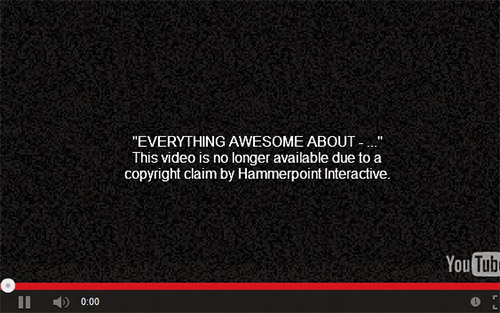MPAA and RIAA Urge Government to Keep High Fines for Copyright Infringers
lundi 18 novembre 2013 à 21:48 When copyright holders go to court in the United States they have the option to demand statutory damages in addition to the actual losses they have suffered.
When copyright holders go to court in the United States they have the option to demand statutory damages in addition to the actual losses they have suffered.
Depending on the severity of the offense, these damages can reach $150,000 per infringement.
In 2009 Jammie Thomas-Rasset learned about these massive fines the hard way when she was fined $1,920,000 for sharing 24 songs online, an amount that was eventually reduced to $220,000 after several appeals. In a similar case, Boston student Joel Tenenbaum was ordered to pay $675,000 for sharing 30 songs.
Fines of this magnitude are often viewed by the public as disproportionate, but copyright holders argue that they are needed to deter the public from engaging in unauthorized file-sharing.
In court, the Obama administration sided with copyright holders earlier this year. However, in its recent Green Paper the Department of Commerce’s Internet Policy Task Force suggests that the current limits may need an update.
“Much public attention has focused on the size of the awards in the two infringement cases against individual file sharers that have gone to trial,” the Task Force wrote.
“These cases have led to calls for further calibration of levels of statutory damages. The Task Force reiterates the importance of statutory damages in online copyright enforcement, but believes that there are certain areas where recalibration of their scope may be appropriate.”
The Internet Policy Task Force asked the public to share their thoughts on this, and several other copyright related issues that were addressed in the paper. The comments, which have now been made public, include several from copyright industry groups such as the MPAA and RIAA in which they advise the Government not to lower the maximum fines.
The MPAA argues that the current Internet landscape doesn’t warrant a policy change.
“While we understand the concerns giving rise to the discussion around statutory damages in the Green Paper, the MPAA does not believe the experience in practice supports altering the existing regime, which has fostered investment and innovation not just in the production of content but also with respect to applications, devices and other digital technologies.”
The movie group says that P2P file-sharing, cyberlockers and streaming sites remain a massive threat to the industry and since it’s not always possible to accurately calculate the losses that are generated by piracy, statutory damages are helpful to come to a sizable punishment.
“Statutory damages play an essential role in redressing the financial harm caused by such infringement and punishing the wrongdoers. But, perhaps most importantly, statutory damages deter others from engaging in similar misconduct, advancing the societal goal of promoting innovation and creativity,” MPAA writes.
The studios don’t fear disproportionate fines and are confident that juries will eventually decide on an amount that is fitting in each case.
“The MPAA is confident that juries will continue to award statutory damages only in appropriate cases, in appropriate amounts, taking into consideration all salient factors, to serve the public interest.”
The RIAA also submitted their comments in response to the Internet Policy Task Force paper. In line with the MPAA the music group sees no reason to change the current policy, and says that “proper consequences” are needed in response to copyright infringement.
“We do not believe that recalibration of statutory damages is appropriate,” RIAA writes.
“Statutory damages must be meaningful, serving as a deterrent beyond mere restitution. And the law recognizes the need for flexibility within this statutory damages construct, and provides juries with wide discretion to determine the appropriate award,” RIAA adds.
The RIAA adds that in the Thomas and Tenenbaum cases the Appeal courts held that the “damage awards were entirely appropriate, based on the facts of each case.”
The music group does say that it’s open to discussing alternatives to statutory damages, as long as the deterrent function of the punishments for copyright infringement remain a core issue.
Besides copyright holders, there were also many comments from civil rights groups, copyright experts and the public that argued against high penalties. Copyright lawyer Andrew Bridges, for example, highlights that a potential $150,000 fine per shared file is ammunition for “predatory” copyright trolls such as Prenda and Righthaven.
“The current structure of statutory damages gives Predatory Enforcers (PEs) the weapons they need to extract significant settlements from accused infringers without regard to the truth of their allegations or the harm of the alleged infringing, just as Righthaven and Prenda did,” Bridges writes.
“One need only allege that there was copying in order to seek a subpoena unmasking anonymous online defendants, at which point PEs can send letters threatening maximum damages of up to $150,000 per infringed work and extract settlements without proving infringement, much less any harm.”
According to Bridges the Government may want to follow the example of Canada, where statutory damages for non-commercial file-sharing were reduced to an amount of between $100 and $5,000 per offense.
All comments in response to the Green Paper have been published on the Internet Policy Task Force website. The issue of statutory damages, as well as many related subjects, will be discussed during a public meeting on December 12 and will be followed by another round of comments.
Source: TorrentFreak, for the latest info on copyright, file-sharing and VPN services.



 This week we have three newcomers in our chart.
This week we have three newcomers in our chart. One recurring problem with the copyright industry is that it gets away scot-free with every glaring and egregious abuse of copyright monopoly law to silence other people, despite breaking the social contract.
One recurring problem with the copyright industry is that it gets away scot-free with every glaring and egregious abuse of copyright monopoly law to silence other people, despite breaking the social contract. 


